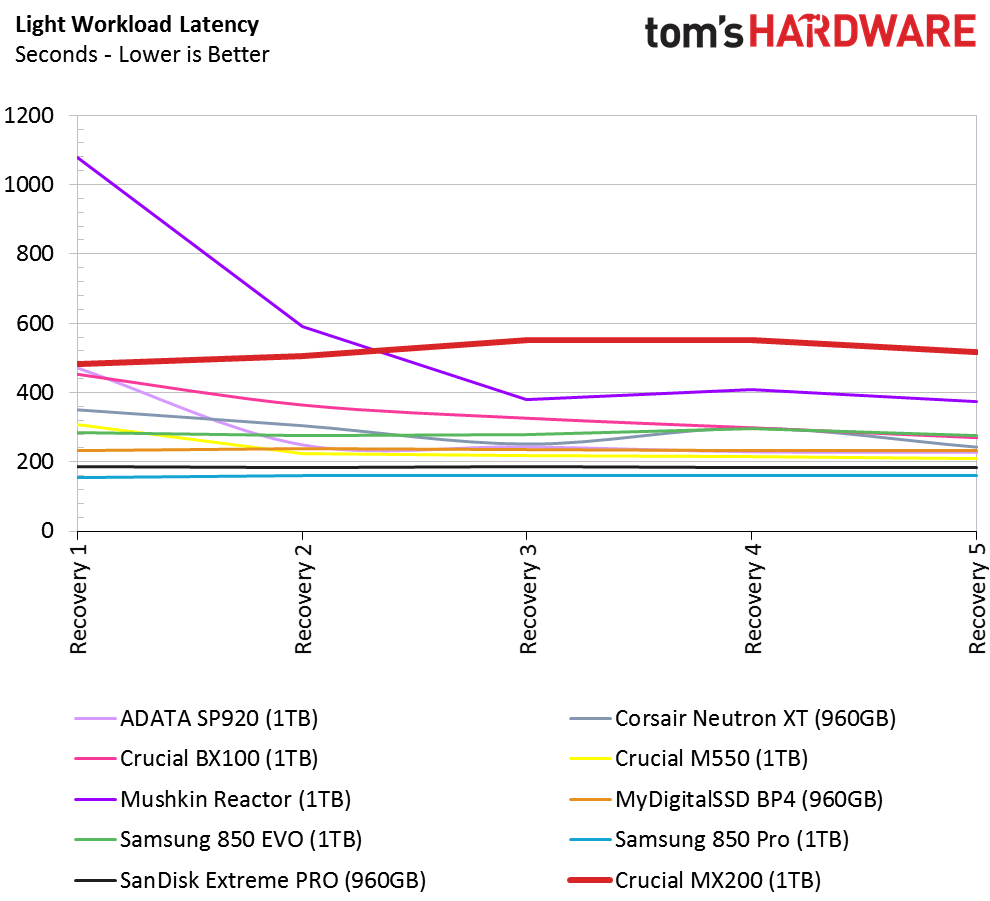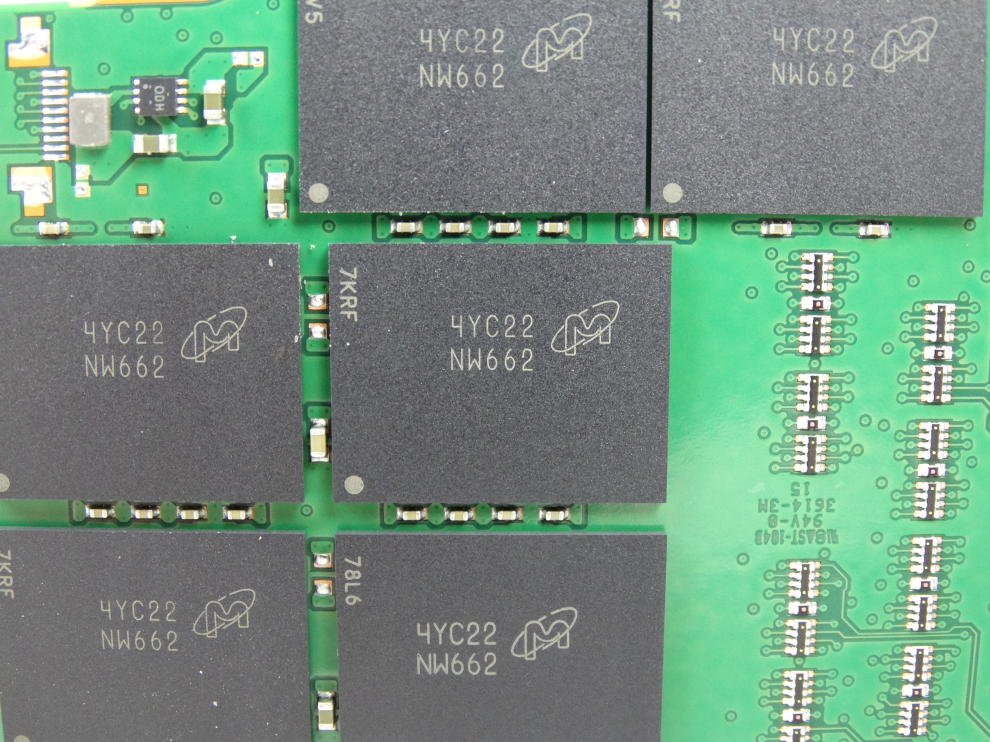Crucial MX200 1TB SSD Review
Why you can trust Tom's Hardware
Conclusion
The MX100 wasn't a performance powerhouse, but Crucial sold boatloads of them. As a flash manufacturer, Crucial's focus is on volume and not all-out performance. The company wants to sell its memory products in stable platforms at low prices. This trend started with the M500 and carries over today.
The MX200 follows suit. It's not a next-gen drive that will pin you back in your seat. No, the MX200 is a sensible SSD that caters to budget-bound power users looking for more than a hard drive replacement without spending 75 cents per gigabyte for flagship performance. Sadly though, Crucial goes too conservative with the MX200. Its 250GB model is the only 2.5" drive with an emulated SLC caching technology. Our tests with the full line-up show that the two largest SSDs write random data faster than that 250GB implementation; however, we can't help but think the technology would have pushed the bigger drives to the performance levels expected in 2015. TurboWrite (Samsung) and nCache (SanDisk) both offer amazing results. They work even better when the writes are spread to more dies in the higher-capacity models.
Crucial's Storage Executive software tames the firmware updating process, but its not perfect yet. We haven't been able to get the tool to update drives that are not the primary system disk (C:\). Otherwise, the utility is a nice, albeit long overdue addition. Crucial doesn't do anything innovative with the software that hasn't been done before by a competitor.
The MX100 and MX200 will coexist, at least for now. At the time of writing, the MX200 with its less expensive flash is priced similarly as the MX100. The 16nm node enables MLC NAND that delivers higher sustained writer performance than 2D planar TLC. But Samsung's 850 EVO uses 3D TLC with a sustained sequential write speed of 400 MB/s. In comparison, the 1TB MX200 only achieved 285 MB/s in our testing. Sealing the MX200's fate is the fact that Samsung's 1TB 850 EVO also benefits from RAPID Mode DRAM cache, the same software features and a $30 price advantage. It's almost comical that Crucial's 1TB model costs more than Samsung's expensive 3D V-NAND TLC drive.
It almost seems like Crucial is launching new SSDs to compete with Samsung. But sales volume doesn't come from a wide selection of SSDs. Just ask OCZ how well that worked. There are currently so many products in the line-up that most customers (even the power users) don't know the difference between them. Crucial's portfolio is so confusing that it's almost faceless. BX100, MX100, MX200...whatever. Which one costs the least on Amazon? If you are shopping for a mid-range 1TB SSD right now, the answer is Samsung's 850 EVO.
Chris Ramseyer is a Contributing Editor for Tom's Hardware, covering Storage. Follow him on Twitter and Facebook.
Follow Tom's Hardware on Twitter, on Facebook and on Google+.
Get Tom's Hardware's best news and in-depth reviews, straight to your inbox.
MORE: Best SSDs For The Money
MORE: Latest Storage News
MORE: Storage in the Forums

Chris Ramseyer was a senior contributing editor for Tom's Hardware. He tested and reviewed consumer storage.
-
Nuckles_56 I'm quite impressed by this drive, I'd have to say that crucial pulled the rabbit out of the hat this timeReply -
Soul_keeper I appreciated the critical honesty in this review.Reply
The conclusion pretty much sums it up. -
twztechman I came to the same conclusion about a month ago and got a 1T Samsung EVO for $370. I have to admit some confusion over the Crucial Line of drives as I was considering a purchase. In my mind, the biggest competitor is/was the Mushkin Enhanced Reactor 1T which got a good review and a recommendation over at Anandtech back in February. Those drives are frequently on sale for $339 which makes them a really good value with good performance.Reply
I will say my old Cruical M4 256 has been a rock solid drive and is being re-purposed as a boot drive in one of my secondary systems. -
ubercake I would say Crucial is going to stress reliability over all-out speed. They usually put out a high-quality reliable product. Most people appreciate this when it comes to storage. On the other hand, the warranty could be longer. 3-year warranties are not very competitive when it comes to the most reliable drives. I personally don't consider SSDs with less than a 5-year warranty in my systems.Reply -
FritzEiv Internet Explorer is presently (early Thur morning 4/30/15) inducing an occasional crash on this article (or perhaps the other way around; a debate for another day). We're looking into the issue and hope to have it resolved shortly. Apologies.Reply
Fritz Nelson, Editor-in-chief -
logainofhades Wouldn't mind having this drive, for my laptop. Only reason I would consider a 1tb is in my laptop. 500gb would be plenty for my desktops, as I have plenty of HDD storage.Reply -
alidan ReplyI would say Crucial is going to stress reliability over all-out speed. They usually put out a high-quality reliable product. Most people appreciate this when it comes to storage. On the other hand, the warranty could be longer. 3-year warranties are not very competitive when it comes to the most reliable drives. I personally don't consider SSDs with less than a 5-year warranty in my systems.
in a perfect world i would be swapping drives out after a year or so and keeping the old drive as a backup, with ssd, i think this would be the best way to go. -
mapesdhs I can't help but feel that when it comes to pricing, manufacturersReply
are holding back. What are they waiting for? Just ditch the
pointless entry level 64GB models, move on already. Annoys me
when I see a 128GB priced at X, with the 64GB version at
something like 85% of X, because... reasons!
Given the shifting demands of users as video moves to HD and
beyond, games take up ever more space, people storing lots
of stuff from their phones, music, etc., surely it's time the
industry went sideways and set 250GB/256GB as a new
baseline (then maybe it'll feel like it's 2015 in at least one
respect; where's the jetpack I was promised as a kid? :)
I guess they won't though because as long as people are still
buying the lower capacity models, presumably there's money
to be made. Just wish one of them would break ranks and go
for it, then the others would follow. IMO if a midrange 256GB
goes below a certain price point, sales will skyrocket, more
than making up via volume for the lower price (a bit like the
way hardback books have a price above which most people
won't buy them).
Interesting btw, here (UK) at 250GB, the 850 EVO is exactly
the same price as the MX200.
Ian.
PS. Chris, one of the article subheaders is wrong, ie. where it
says, "A Closer Look at the MX100 1TB" - presumably that
should be 'MX200'. ;)
-
CRamseyer Thanks Ian, we fixed that one earlier today.Reply
In response to your statement. You might have noticed we don't list 128GB models in the Best of Monthly anymore. I don't plan on reviewing any 128GB models either.
When we move to 256Gbit die the entry point will be 512GB and the 256GB drives will fall off. The 128GB drives till have a place in the market right now for business users and Facetwit Surfers but that group rarely reads performance reviews when shopping for a commodity product. -
mapesdhs Reply15781622 said:In response to your statement. You might have noticed we don't list 128GB models in the Best of Monthly anymore. I don't plan on reviewing any 128GB models either.
Very wise. I know some have moaned, but it's for the best. As long as
consumers keep buying lesser capacities, manufacturers will stall the
advancement of newer tech if they think they can keep making more
money from older entry products.
15781622 said:When we move to 256Gbit die the entry point will be 512GB and the 256GB drives will fall off. ...
Hooray!! It would be great if everything could shift to 512GB minimum,
but I can't see that happening this year. Too many are still happy to
buy 256GB units. I'm looking for a 512GB atm, but what feels to me
to be an 'acceptable' price isn't even enough for an Arc. I'm building a
PC for someone soon, a typical pro user who isn't that bothered about
the tech nerdyness of it all and doesn't know what stuff costs now.
Their immediate feeling of a sensible boot drive capacity was 512GB,
which is hardly surprising given they've been using an old Dell 650 with
a 300GB SCSI disk for some time. Despite the speed, I'm sure a
256GB SSD would feel too much like a downgrade.
I had a look at Scan's 3XS pro-user systems recently, was surprised
at how many of the top-end models (costing high thousands) only
have 256GB SSDs. Surely not enough these days, though at least
they were mostly using Samsung EVO/Pro models.
Seems like in so many areas of tech now, it's all just gradual
percentage increases year after year. Nobody does anything to break
the mould. So much for all the big research headlines in the last 20
years promising huge breakthroughs in storage, etc. Sums up the
mediocre CPU speedups we've had since SB, similar MO. I get Intel
not forging ahead, no competition, they don't have to, but one would
think with SSDs there'd be scope for at least one maker to really
hurl the cat among the pidgeons somehow. Insert a CinemaSins
Jeremy-style *sigh*. :}
15781622 said:... Facetwit Surfers ...
That made me laugh. :D
I use 128s for system testing, but that's all. After installing the
benchmarks I use, a 128 is basically full, especially if it's in a
system that has a lot of RAM (bigger paging file) or a 'pro' build
(Viewperf12 uses so much space). Indeed, for a system with
64GB RAM, a 128 is perfect as a dedicated paging file device.
Ian.

